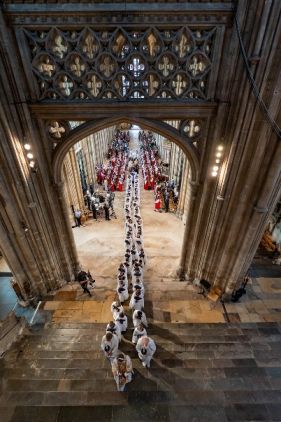RIP Church of England? Long live gospel Anglicanism

So this is the way the Church of England ends – not with a bang, nor even a whimper, but with a somewhat tortuous and at times embarrassingly bad debate.
It was hard to tell the precise moment the Church of England died. Like many patients which have been on life-support for some time, one moment it seemed to be there – and then it just wasn't any more. Something had gone. Or so it seemed to this observer today.
The classic, orthodox Church of England looked dead in the eyes of many when on 9 February 2023 its General Synod passed a motion which was, firstly, self-contradictory, and, secondly, a huge departure, it was plain to many – except for those caught up in some of the Synodical groupthink – from the doctrine of the one, holy, catholic apostolic church throughout history and across the world.
The Synod approved a classic Anglican fudge involving sophistry, tortuous logic and, some might say, downright intellectual and theological dishonesty. It decided, at one and the same time, to support the introduction of prayers in relation to same-sex blessings which simultaneously clearly departing from C of E and global Christian doctrine while, at exactly the same moment, insisting that they did no such thing. Go figure. This way madness lies.
Of course, this is an instant reaction. Time may prove me wrong, or indeed I may subsequently find myself to have been mistaken - it has been known. But I shall be happily surprised if in 10 years' time many orthodox believers in the C of E (or by then, perhaps out of it) do not look back and see in this day a defining moment in which a rubicon was crossed.
The motion passed by the Synod and the thinking from the bishops on which it was based was not only Biblically illogical, theologically illiterate and intellectually lightweight, but also a clear departure from the majority view of the vast bulk of the worldwide Anglican Communion and other Christian denominations (Eastern Orthodox, Roman Catholic, Pentecostal etc etc) – whatever might be said to the contrary.
Moreover, it is clearly counter-productive in purely pragmatic terms, as all the statistics show that denominations which go down this path enter into accelerated and seemingly terminal decline (see English Methodism and the US Episcopal Church among others for more details).
And on that detail, we might also note that by far the majority of churches in the C of E which (a) have young people and children and (b) are growing, are those which take an orthodox position on all these issues – not a liberal, revisionist one. There's none so blind as those that will not see. Muslims will be laughing their socks off as they see the way clear for them to become the new alternative moral voice to cultural liberalism in the UK.
Many C of E evangelicals may now be considering their position in the denomination. The Church of England Evangelical Council (CEEC) has promised a "menu" of actions to bring about "visible differentiation" – otherwise known as separation from ungodly error. This may or may not be sufficient for some, depending on the detail.
Others may look for alternative episcopal oversight – perhaps from the Anglican Mission in England (AMiE) and Anglican Convocation in Europe (ACE), both Gafcon-affiliated under the Anglican Network in Europe (AMiE), or other bishops from Gafcon or the majority Global South. Still others may want to leave, while at the same time considering their parish responsibilities; or whether there is any possibility of securing long-term gospel ministry, which is important; and family commitments which may tie them in post. Again, there will be those who may try to take their congregations and buildings out of the C of E. Others may just instantly decide enough is enough and resign.
There will no doubt be much analysis, some of it heated, about what has or has not just occurred. For all of us, however, who take the Biblically-faithful and orthodox Christian majority position, it seems incumbent upon us to do three things, whatever ultimately happens in our own situations.
The first thing is to pray: for without wisdom, without the power of God, without taking time to think and pray we can do nothing and will make bad calls. Secondly, we should plan, rather than just making a decision with no thought. And thirdly (in order to keep the alliteration of having a third "p"!) we should "panic not"...
We should not panic because the Lord reigns (Psalm 99v1). We should not panic because the Lord has promised to build his church and that hell will not prevail against it. And we should not panic because across the world, global, gospel Anglicanism – the Anglicanism to which many of us still aspire – is alive and well and kicking and growing.
David Baker is Contributing Editor to Christian Today and Senior Editor of the newspaper and website EN, available at less than the cost of a cappuccino per month at https://www.e-n.org.uk in print and online. He writes here in a purely personal capacity.











